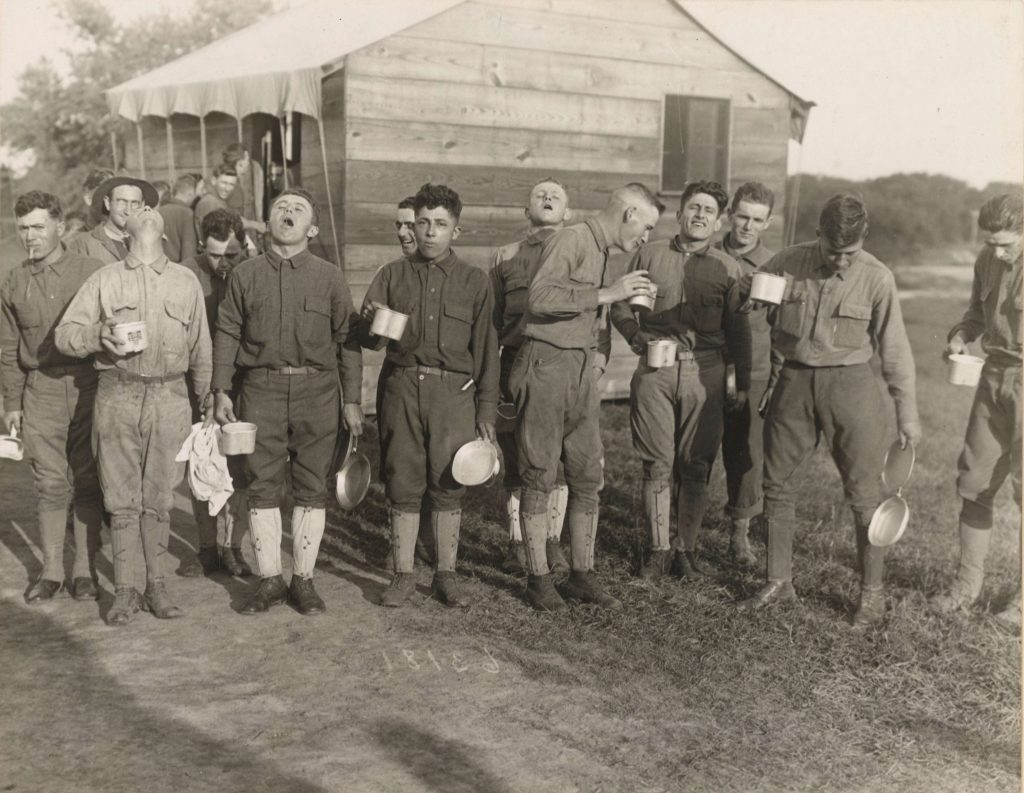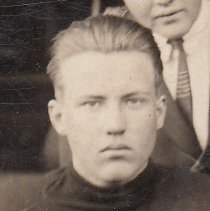
Warm and sunny, one of those great fall days. You’re in line. One by one, they line up. You’re stepping forward, a few feet at a time. You normally train for war but today, you’re doing something else. Into the wooden shed you go. They hand you a cup of warm, salted water. They bark at you: go outside, tilt your head back, gargle, and spit—and don’t spew all over the next guy. That’s your regimen this day to avoid influenza at Camp Dix, New Jersey.
Next in line.
A young girl outside Boston, Massachusetts writes in her diary that she is “in bed, feel rotten, school closed till Monday.” A young woman in Boston writes in her diary: “serious epidemic everywhere. Canned carrots.” A friend of her family has influenza.
On up the East Coast, in Newburyport, Maine, they’ve decided to close the schools. They’ve also decided to go ahead with a scheduled public “sing-along” for anyone interested. Quite likely, hundreds will show up.
Big numbers swirl about. 600 cases of influenza at Camp Logan near Houston, Texas. 10,000 posters tacked up in New York City that warn of the illness.
There are arguments over no numbers at all. The people of Kansas City, Missouri read in newspapers that “influenza heading west.” Further west, at Camp Lewis, Washington an army officer asserts that the “Spanish influenza” isn’t here.
James Creel is a strapping young man, a former member of the football team at Washington and Jefferson College, Class of 1915. His team—known as the Presidents—won eight of nine games his senior year, including a tough win over Yale University where Tom Buchanon, Jay Gatsby’s antagonist, was fictionalized as a football star the same year. Broad-shouldered, fighting trim, and as real as a hit from the blind-side, Creel dies from influenza at the Great Lakes Naval Training station on the southwestern shore of Lake Michigan.
Creel’s mother and father are inconsolable. Their son had a shining future, a life ahead with nothing but potential.

A thought for you on Day 17, March 29, 2020, seventeen days after President Trump declares Covid-19 a national emergency—you make do with doing the little things, the mundane things. The soldiers at Camp Dix stand, sip, swirl, and spit. That’s what they do. And influenza comes or not, kills or not. You grab onto the thing you can do—the sensible, practical, workable stuff—and time passes after that. That’s the truth you know—the time passes hour by hour, day by day, week by week. The challenge is not only the passing, although when combined with not knowing it can be difficult enough. Instead, bigger than that, the challenge is in what to do during and with the passing. The passing is the future becoming the present. It’s the potential that James Creel was denied but which, as experienced in your life right now, you can convert into caring, helping, serving, reaching to and for someone else. Potential isn’t a guarantee. It’s simply and profoundly an opportunity heading your way along with pieces of reality you might not want. And then you’ll be encountering time passing all over again. With more potential. Do something with it, for James. It’s your chance to lay flowers at his grave where the year “1918” is chiseled in stone.
(note to reader—I invite you to subscribe to this series/blog. The purpose of my posting in this series is the purpose of my enterprise at Historical Solutions—to explore the past in a new way that brings new and different value to you, both in the present (this minute) and on the edge of the future (what’s ahead or forward of this minute). The past is everything before now, the totality of all time before the present; history is a set of very small slices of the past that, for a particular reason, have been remembered. If you wish to contact me privately, please do not hesitate to text or call 317-407-3687)







